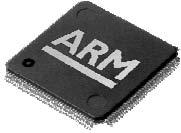ARM Preps Entry In 64-bit Server Market
ARM has just disclosed the first information about its ARMv8 architecture at its ARM TechCon 2011 conference.
ARMv8 will succeed ARMv7, which is the foundation for current processors such as the Cortex-A9 and Cortex-A15. What makes ARMv8 special is the addition of a new "A64" 64-bit instruction set, which will enable the company to move much more aggressively into the server and enterprise computing space.
ARM's new processors will feature both 32-bit and 64-bit (AArch32 and AArch64) execution states.
"With our increasingly connected world, the market for 32-bit processing continues to expand and evolve creating new opportunities for 32-bit ARMv7 based processors in embedded, real-time and open application platforms." said Mike Muller, CTO of ARM. "We believe the ARMv8 architecture is ideally suited to enable the ARM partnership to continue to grow in 32-bit application spaces and bring diverse, innovative and energy-efficient solutions to 64-bit processing markets."
ARM specifically referred to servers as a new application area for its products, which may raise some interest at Intel. It appears that ARM will take its time with this effort and said that it has begun building an ecosystem around its 64-bit instruction set. the company said it will disclose the first ARMv8 processors in 2012, but it does not expect systems using these chips to appear until 2014. Initial support for open source OS support is apparently in the works at this time.
However, it is particularly interesting that ARM was able to score not only high-profile quotes from AppliedMicro and Nvidia in its press release, but also a quote from Microsoft, which appears to be participating in this effort was also quoted: "ARM is an important partner for Microsoft," a statement attributed to KD Hallman, general manager at Microsoft reads. "The evolution of ARM to support a 64-bit architecture is a significant development for ARM and for the ARM ecosystem. We look forward to witnessing this technology's potential to enhance future ARM-based solutions."
Get Tom's Hardware's best news and in-depth reviews, straight to your inbox.

Wolfgang Gruener is an experienced professional in digital strategy and content, specializing in web strategy, content architecture, user experience, and applying AI in content operations within the insurtech industry. His previous roles include Director, Digital Strategy and Content Experience at American Eagle, Managing Editor at TG Daily, and contributing to publications like Tom's Guide and Tom's Hardware.
-
captaincharisma otacon72Maybe ARM will be able to challenge intel at some point since AMD is a lost cause.Reply
with how bad bulldozer turned out to be ARM would have a good chance of taking the number 2 spot in the CPU race
-
saturnus Projected raw processing power per core, clock to clock = Ivy Bridge based Xeon x32 to 128 cores on a single SoC (Server On a Chip) with integrated I/OReply
Down to 300mW idle power for the entire SoC
Intel (and AMD). Hell has just frozen over. Game over! -
cheepstuff That battle between ARM and Intel that we have been waiting for is finally starting. This should be exciting.Reply -
julianbautista87 stop saying that AMD is dead. I mean, come on, they are doing well in the gpu and apu market, and they have a small but millionaire share in the desktop and server market.Reply
People used to say the same about Apple like 12 years ago (when PC overwhelmed them) and look at them now.
It's nice that ARM is entering the server market. I hope they enter the desktop market as well, competition is good for the economy. -
alidan julianbautista87stop saying that AMD is dead. I mean, come on, they are doing well in the gpu and apu market, and they have a small but millionaire share in the desktop and server market. People used to say the same about Apple like 12 years ago (when PC overwhelmed them) and look at them now.It's nice that ARM is entering the server market. I hope they enter the desktop market as well, competition is good for the economy.Reply
... they became a music than phone company and finally made money? -
Forgive my ignorance, but what does ARM-64 have that MIPS-64 doesn't? I mean, I know MIPS64 is old, but what is the advantage of ARM designs? Is ARM just being more aggressive with ISA and microarchitecture improvements?Reply
-
memadmax This outta be interesting.Reply
But can a smartphone builder be a real contender with the bigboys in the server market?
We'll see.
